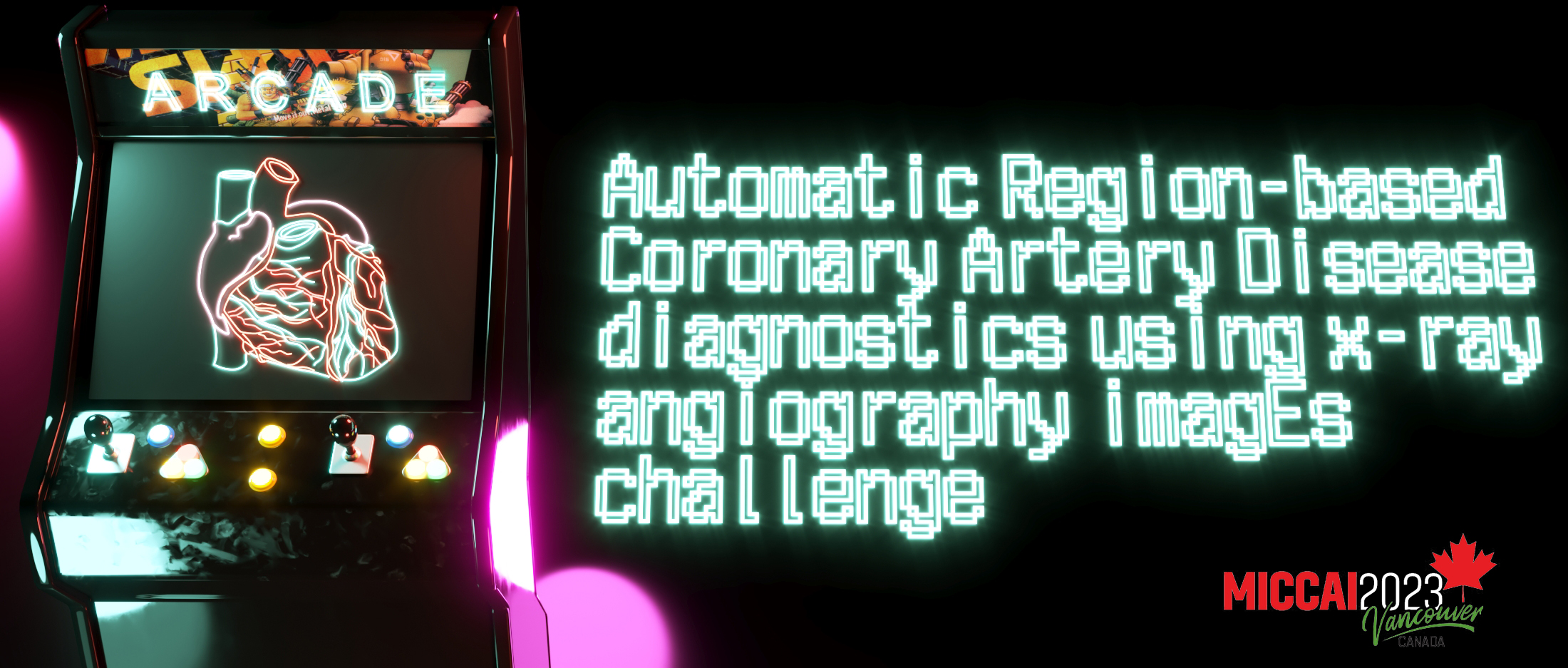ARCADE Challenge¶
Welcome to Automatic Region-based Coronary Artery Disease diagnostics using x-ray angiography imagEs challenge website. ARCADE challenge will be held at MICCAI 2023¶
Important information:¶
We are please to announce that our dataset publication is available with open access. https://www.nature.com/articles/s41597-023-02871-z#citeas¶
We will contact corresponding authors of submitted papers that require revision and correction. Please check your email.¶
Participation certificates were sent via email for team representatives.¶
Final leaderboard:¶
| Final Phase Segmentation | Final Phase Stenosis |
|---|---|
| 1. TideSing | 1. Medipixel |
| 2. Medipixel | 2. Multi Modal Learning Lab |
| 3. NUteam | 3. NUteam |
| 4. Heartwise | 4. ICM |
| 5. TeamZERO | 5. Heartwise |
| 6. Multi Modal Learning Lab | 6. TeamZERO |
| 7. ICM | 7. BMS |
| 8. BMS |
We are happy to announce that our challenge will be presented as satellite event on MICCAI 2023 conference in Vancouver Canada. Our presentation will be held on October 12 from 8 am to 12 pm in the room 13, moreover virtual attendance is possible.¶
We want to remind you that virtual participants must be registered for the appropriate day of satellite events in order to see their event on ConFLUX and thus access their Zoom session. For registration please follow the link https://conferences.miccai.org/2023/en/REGISTRATION.html and select option "WORKSHOPS, TUTORIALS and CHALLENGES" with proper date (October 12).¶
Information regarding paper submission:¶
-
We recommend to write papers which are 10-15 pages, including references.
-
All authors should include their ORCID identification number in the paper.
-
Corresponding author should complete and sign the License-to-publish form.
-
Figure should be clear and readable.
-
Tables and equations should be editable.
-
Please pay attention to LNCS format and guidelines. Plagiarism will be checked for every paper.
-
LaTeX and Word templates are available on the LNCS author’s page.
-
The articles will be submitted through the ARCADE challenge official email. We can provide consent form for your article (only research usage).
- !We provide additional time for paper submission!
Congratulations!!! Final submission phase is closed. Clarification regarding conference proceedings: all participants are welcome to write short description paper for each task. Participants who participated only in one task can submit one paper. We highly recommend to write more then 10 pages for each paper. All participants can write and submit a paper regardless of the results. Please contact us if you have any questions.
Information about paper submission was added¶
Challenge submission is now open! Please find instructions here: https://arcade.grand-challenge.org/submission-instructions/ !!September 6th - September 19th (23:59 PT). 2023: Challenge submission.!! Considering technical issues and difficulties our team decided to provide more time for submission. If you have any technical issues please contact bulegenov@cmctech.pro !!Testing cases will be released after challenge submission deadline!!. All participants are recommended to write short method description paper. Description papers should follow the Springer Lecture Notes in Computer Science. Dataset was updated with validation dataset, please find link here https://arcade.grand-challenge.org/data/. Phase_1 submission close dates were postponed to August 14th. Challenge submission and release of the testing cases dates were changed. 07.06.2023 - Submissions for phase 1 are open now! You can check your model RESULTS for validation case. 31.05.2023 - Helpful scripts including conversions of COCO annotations to YOLO format, masks to COCO and etc. are posted on official github page of this challenge: https://github.com/cmctec/ARCADE. All teams and individual participants should create a new teams on https://arcade.grand-challenge.org/teams/.
Background
Coronary artery disease (CAD) is a condition that affects blood supply of heart, due to buildup of atherosclerotic plaque in the coronary arteries. CAD is one of the leading death causes around the world. The most common diagnosis procedure for CAD is coronary angiography, which uses contrast material and X-rays for observation of lesions in arteries, this type of procedure showing blood flow in coronary arteries in real time what allows precise detection of stenosis and control of intraventricular interventions and stent insertions. Coronary angiography is useful diagnostic method for planning necessary revascularization procedures based on calculated occlusion and affected segment of coronary arteries. The development of automated analytical tool for lesion detection and localization is a promising strategy for increasing effectiveness of detection and treatment strategies for CAD.
Challenge
There are very few works aimed to segment coronary arteries, and currently it is very costly and time-consuming to manually select segments and stenotic lesions within coronary angiography. This challenge’s purpose is to benchmark coronary artery segmentation as well as stenosis detection methods which could be used to reduce time spent while maintaining high accuracy of coronary angiography analysis. For that, dataset of coronary angiography frames with labelled coronary artery segments and the locations of stenotic plaques are provided.
Coronary artery segments were labelled following Syntax Score definitions. It is expected for models to be able to effectively augment given number of images to increase the robustness.
To sum up the challenge:
1) 2 supervised tasks: coronary artery segmentation and stenosis detection (segmentation) (both tasks are instance segmentation tasks).
2) 1500 images with labeled coronary arteries and 1500 images with labeled stenosis for training and testing.
3) Evaluation metrics: challenge submissions are evaluated using mean F1 score and will be tested on 300 images for both tasks. Inference time limit is set to be 5 seconds/per image.
Examples of labeled images:



Timeline of ARCADE challenge:
April 14th - May 19th May 28th, 2023: Registration to the
challenge opens
May 29th, 2023: Release of the training cases.
August 17th August 28th September 6th- September 19th (23:59
PT), 2023: Challenge submissions.
September 30th October 5th (23:59 PT), 2023: Summary paper
submission deadline.
October 10th, 2023: Paper acceptance notification
October 20th, 2023: Modified paper submission deadline.
October 20th - 29th, 2023: Paper review phase.
September 25th 2023: Release of the testing cases..
October 8th - October 12nd, 2023: MICCAI event and release of challenge ranking.
